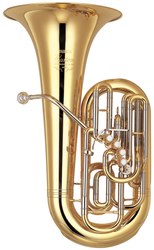This article needs additional citations for verification. (October 2019) |
 A bass tuba in F with front-action piston valves | |
| Brass instrument | |
|---|---|
| Classification | |
| Hornbostel–Sachs classification | 423.232 (Valved aerophone sounded by lip vibration) |
| Inventor(s) | Wilhelm Friedrich Wieprecht and Johann Gottfried Moritz |
| Developed | 1835 |
| Playing range | |
 | |
| Related instruments | |
| Sound sample | |
| Part of a series on |
| Musical instruments |
|---|
The tuba (UK: /ˈtjuːbə/;[1] US: /ˈtuːbə/) is the largest and lowest-pitched musical instrument in the brass family. As with all brass instruments, the sound is produced by lip vibration – a buzz – into a mouthpiece. It first appeared in the mid-19th century, making it one of the newer instruments in the modern orchestra and concert band, and largely replaced the ophicleide.[2] Tuba is Latin for "trumpet".[3]
A person who plays the tuba is called a tubaist, a tubist,[4] or simply a tuba player. In a British brass band or military band, they are known as bass players.
- ^ "tuba noun - Pronunciation | Oxford Advanced Learner's Dictionary at Oxford Learner's Dictionaries". Oxfordlearnersdictionaries.com. Retrieved 18 April 2021.
- ^ Forsyth, Cecil (1982). Orchestration. New York, NY: Dover Publications, Inc. p. 530. ISBN 0-486-24383-4.
- ^ "tuba definition - Latin Dictionary". Latin-Dictionary.org. Archived from the original on 22 June 2015. Retrieved 4 February 2018.
- ^ "Tuba". Merriam-Webster. Retrieved 2012-05-26.